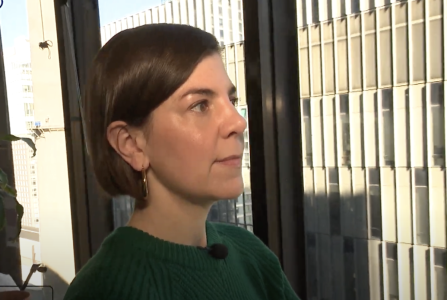How a $50K scam fooled a finance expert—and what it means for the rest of us
By
Veronica E.
- Replies 0
You might think you’ve seen every trick in the book when it comes to scams.
But what happened to one sharp, financially savvy young mom might make you think twice.
In just a few hours, she went from confidently managing her finances to handing a shoebox full of cash to a complete stranger in a white car—believing her freedom depended on it.
If it sounds unbelievable, that’s exactly what makes this story so important.
Scammers are getting better at what they do—and they’re counting on you thinking you’d never fall for it.
Let’s take a closer look at how it happened, what red flags were missed, and how you can keep yourself (and your money) safe.

It started with a phone call from “Amazon”
Charlotte Cowles, a well-known financial journalist, received a call one day that looked like it came from Amazon.
The voice on the line was polite and professional, alerting her to suspicious purchases on her account.
When she said she hadn’t bought anything, the caller told her that her identity might have been stolen—and that the Federal Trade Commission (FTC) was involved.
Before she knew it, she was speaking with someone claiming to be an FTC investigator.
He knew her address, birthday, and even part of her Social Security number.
He said 22 bank accounts, nine cars, and four properties had been registered under her name.
Then came the threats: her home could be raided, her accounts frozen, even her child taken away.
In a panic, Charlotte followed his instructions.
She withdrew $50,000 in cash, packed it into a shoebox, and handed it to a man waiting in a white Mercedes who claimed to be from the CIA.
It wasn’t until he drove away that she realized what had just happened.
Also read: Discover the smart scam alert that could protect your bank account!
How even smart people get fooled
Charlotte wasn’t someone you’d expect to fall for a scam.
She’s educated, confident, and works in personal finance.
But scammers are trained to exploit emotions—especially fear.
They use real information (often found online) to gain your trust and push you to act fast, leaving no time to think.
These scams aren’t just targeting the elderly or inexperienced anymore.
In fact, the FTC reports that younger adults are now more likely to report financial losses to scams than those over 60.
It’s a clear sign that no one is completely immune.
Also read: Scam alert—why your phone is suddenly getting fake job offers
Watch for these common scam tactics
Even the most convincing scams often follow the same playbook. Here’s what to look out for:
Also read: This online scam completely drained her bank account—Here’s how you can avoid the same disaster
4 simple steps to protect yourself
Here’s how you can avoid falling into the same trap:
1. Stop and double-check
If a call, text, or email feels urgent or suspicious, pause. Call the organization directly using a trusted number—not the one they give you.
2. Keep personal info private
Never give out your Social Security number, bank details, or passwords unless you made the first contact and know who you’re talking to.
3. Question strange payment requests
No real company or agency will ever ask you to pay in gift cards or hand over cash to someone in a car. That’s a big red flag.
4. Talk it through with someone you trust
Scammers want to isolate you. If something doesn’t feel right, tell a friend, family member, or your bank. Sometimes just saying it out loud helps break the spell.
And a few extra tips:
If you think you’ve been scammed, don’t be ashamed—act quickly.
Contact your bank, file a police report, and report the scam to the FTC at reportfraud.ftc.gov.
The faster you move, the better your chances of recovering funds or stopping further damage.
Read next: This Social Security scam isn’t just stealing info—it could hijack your whole system

`
Have you or someone you know ever faced a situation like this? What tipped you off—or what do you wish you’d known? Share your story or advice in the comments. Your experience could be exactly what someone else needs to stay safe.
At The GrayVine, we believe that staying informed—and looking out for one another—is the best defense against these ever-changing threats.
But what happened to one sharp, financially savvy young mom might make you think twice.
In just a few hours, she went from confidently managing her finances to handing a shoebox full of cash to a complete stranger in a white car—believing her freedom depended on it.
If it sounds unbelievable, that’s exactly what makes this story so important.
Scammers are getting better at what they do—and they’re counting on you thinking you’d never fall for it.
Let’s take a closer look at how it happened, what red flags were missed, and how you can keep yourself (and your money) safe.

Charlotte Cowles, a financial writer, shared her shocking story to raise awareness about how even savvy individuals can fall victim to today’s sophisticated scams. Image Source: YouTube / Inside Edition.
It started with a phone call from “Amazon”
Charlotte Cowles, a well-known financial journalist, received a call one day that looked like it came from Amazon.
The voice on the line was polite and professional, alerting her to suspicious purchases on her account.
When she said she hadn’t bought anything, the caller told her that her identity might have been stolen—and that the Federal Trade Commission (FTC) was involved.
Before she knew it, she was speaking with someone claiming to be an FTC investigator.
He knew her address, birthday, and even part of her Social Security number.
He said 22 bank accounts, nine cars, and four properties had been registered under her name.
Then came the threats: her home could be raided, her accounts frozen, even her child taken away.
In a panic, Charlotte followed his instructions.
She withdrew $50,000 in cash, packed it into a shoebox, and handed it to a man waiting in a white Mercedes who claimed to be from the CIA.
It wasn’t until he drove away that she realized what had just happened.
Also read: Discover the smart scam alert that could protect your bank account!
How even smart people get fooled
Charlotte wasn’t someone you’d expect to fall for a scam.
She’s educated, confident, and works in personal finance.
But scammers are trained to exploit emotions—especially fear.
They use real information (often found online) to gain your trust and push you to act fast, leaving no time to think.
These scams aren’t just targeting the elderly or inexperienced anymore.
In fact, the FTC reports that younger adults are now more likely to report financial losses to scams than those over 60.
It’s a clear sign that no one is completely immune.
Also read: Scam alert—why your phone is suddenly getting fake job offers
Watch for these common scam tactics
Even the most convincing scams often follow the same playbook. Here’s what to look out for:
- Pretending to be someone you trust: Scammers pose as representatives from Amazon, the IRS, Medicare, or even law enforcement.
- Creating a crisis or reward: They’ll say you’re in danger or that you’ve won something big—but you have to act now.
- Pushing you to move quickly: Time pressure keeps you from thinking clearly or asking others for help.
- Requesting unusual payment methods: They’ll ask for gift cards, wire transfers, cash drop-offs, or cryptocurrency—anything that’s hard to trace.
Also read: This online scam completely drained her bank account—Here’s how you can avoid the same disaster
4 simple steps to protect yourself
Here’s how you can avoid falling into the same trap:
1. Stop and double-check
If a call, text, or email feels urgent or suspicious, pause. Call the organization directly using a trusted number—not the one they give you.
2. Keep personal info private
Never give out your Social Security number, bank details, or passwords unless you made the first contact and know who you’re talking to.
3. Question strange payment requests
No real company or agency will ever ask you to pay in gift cards or hand over cash to someone in a car. That’s a big red flag.
4. Talk it through with someone you trust
Scammers want to isolate you. If something doesn’t feel right, tell a friend, family member, or your bank. Sometimes just saying it out loud helps break the spell.
And a few extra tips:
- Don’t click on links or download attachments from unfamiliar senders.
- Never give anyone remote access to your device unless you’re certain it’s legitimate.
- Be cautious with surprise offers, even if they sound tempting.
- If you get unexpected money, don’t return it before checking with your bank.
If you think you’ve been scammed, don’t be ashamed—act quickly.
Contact your bank, file a police report, and report the scam to the FTC at reportfraud.ftc.gov.
The faster you move, the better your chances of recovering funds or stopping further damage.
Read next: This Social Security scam isn’t just stealing info—it could hijack your whole system
Key Takeaways
- Charlotte Cowles, a financial columnist, lost $50,000 to a scammer posing as an FTC agent investigating identity theft.
- The scam used spoofed caller IDs, urgent threats, and convincing personal details to create fear and force quick action.
- Even experienced and educated individuals are vulnerable—scammers exploit emotion, panic, and isolation.
- Experts recommend verifying suspicious contacts independently, refusing untraceable payment methods, and speaking with someone you trust before acting.
Have you or someone you know ever faced a situation like this? What tipped you off—or what do you wish you’d known? Share your story or advice in the comments. Your experience could be exactly what someone else needs to stay safe.
At The GrayVine, we believe that staying informed—and looking out for one another—is the best defense against these ever-changing threats.






